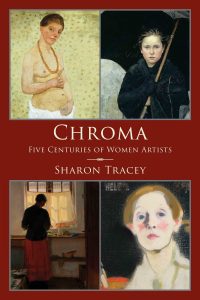 Review by Sherre Vernon
Review by Sherre Vernon
Sharon Tracey is the author of two poetry collections, Chroma: Five Centuries of Women Artists and What I Remember Most is Everything. Her work has appeared in The Worcester Review, The Ekphrastic Review, Rain Taxi and elsewhere. She currently serves on the board of Perugia Press and is based in western Massachusetts.
Chroma: Five Centuries of Women Artists is collection of poetry offered as sort of live exhibit meant to be attended. As we first enter, we are greeted by epigraphs from Sappho and Simonides of Ceos. Then, between opening and closing remarks offered as single poems, Sharon Tracey tours us through four curated galleries of work. We are asked to enter a series of spaces where the self and reflections-of-self are on display, each gallery taking us into conversation with ourselves, the poet, and the women artists who inspired her poems. Like Tracey, “I do not know which to love more / the poetry of the painting / or its chroma, / the painting’s lament / or its echo” (13).
Because each of Tracey’s poems is ekphrastic to some degree, her poems are titled, organized and labeled as date-stamped, visual media. The dated galleries provide a chronological structure to Tracey’s work, with each one going further back in time, and subsequently, for longer blocks of time, as artwork created by women for public consumption becomes more and more scarce. With the first gallery covering approximately four decades, and final one covering more than three centuries, a biproduct of being submerged in Chroma’s structure is to ask the author: Where have all the women gone? Why are there so few of us? The answer, perhaps, is that “[m]aybe she means to say something / about stripping away, about waiting” (36).
In joining Tracey as she moves from painting (mostly) to painting in this textual exhibit, we are eavesdropping on her responses to the work and women she is studying. Sometimes her poems are pure ekphrasis: word-visions mirrored back to the seen realm, and expanded. Other times, Tracey takes on the voice of the artist in front of her, offering us epistolary persona poems, various imaginings of what it was to be a creative woman at a given moment in time. Other times, Tracey holds a conversation with the work in front of her, uses it to read meaning into her own (or more precisely, her speaker’s) life. In each instance, “The painting [speaks]in prism tongues. / It [is]the voice of a woman” (13).
To fully absorb the work Tracey has created requires a willingness to engage in both the visual art that inspired her, and the words on the page. We should note “to self upon entering …come look, let/ something go—Push…Let lines and shapes speak” (38) Chroma is simultaneously a poetic history of the creative woman, a commentary on women in the artistic realm, and collection of moving poems that speak to the potential of our own voices, here and today.
Chroma by Sharon Tracey
Shanti Arts Publishing, Year, $12.95 [paper]
ISBN 9781951651497
Sherre Vernon (she/her/hers) is the author two award-winning chapbooks: Green Ink Wings (fiction) and The Name is Perilous (poetry). Her work has nominated for Best of the Net and anthologized in several collections, including Bending Genres and Best Small Fictions. In 2019, Sherre was a Parent-Writer Fellow at MVICW. Readers describe her writing as heartbreaking, richly layered, lyrical and intelligent. To read more of her work visit www.sherrevernon.com/publications and tag her into conversation @sherrevernon.
